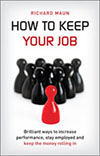better business blog
Tips and stories to add value to you and your organisation

The Trap Of Helping
One of the first things I learned, when training to be a coach, was the difference between saying to a client:
How can I help you?
And…
How can I support you?
When we offer help it does tend to assume that we can help the client, which may not be the case. This can sound great, but can mean us doing the work, instead of the client thinking for themselves.
When we offer support, there is less Parental content and the question is more general. Parents help their children, which is perfectly natural, but when the children grow up they often don’t want help. They can sort it for themselves. What they need is support.
Sometimes support can mean listening and allowing them space so they work out the issue. Maybe they ask for our help with a specific item, once they’ve thought about it, and that’s okay too.
If we are working in an organisation and always being helpful to others we tend to step into a Parental role and can accidentally infantilise people. We keep them down, without meaning too, but we still do it.
We solve their problems and in doing so remove the opportunity for the problem to be properly investigated and sorted. We do their work for them instead of doing our own, which creates a backlog at our desk.
When we are challenged on this we say…But I’m only being helpful!
This can be very hard to deal with because being helpful is socially acceptable, even though we are working against the best interests of the organisational process.
Criticising someone for being helpful seems harsh, so we don’t do it and instead grumble to ourselves.
Being helpful can be a trap for us. We are well motivated and yet cause a nuisance at the same time because we mask underlying issues and don’t get our own work done.
Therefore it’s good to spot when we are being too helpful. Instead of diving in, we can help by being not helpful.
We can say…I’m really busy right now and maybe I can help you later?
This is kindly and generally means the other person has space to solve the issue for themselves. They will learn how to resolve things.
If they can’t complete the task the organisation will have to do something about it, such as offer more training, change the process, or add in more capacity.
The organisation benefits for both today and tomorrow, we get our work done and everyone is happy.
This week we can do some thinking about being helpful. Are we masking the issue instead of fixing it? Are we being Parental instead of giving people the space to be an Adult and solve their own problems?
We don’t help them outside of work and they manage to sort their lives out when we’re not around!
We can avoid the trap of helping all the time and everyone wins.
Next week: Personal PR
e-publishing
Click icon for details


recent posts
browse archive
books
Click cover to view details on Amazon

How to Keep Your Job
Brilliant ways to increase performance, stay employed and keep the money rolling in
Published 2011 Marshall Cavendish
208pp

Job Hunting 3.0
Secrets and skills to sell yourself effectively in the Modern Age
Published 2010 Marshall Cavendish
260pp

 RSS
RSS


